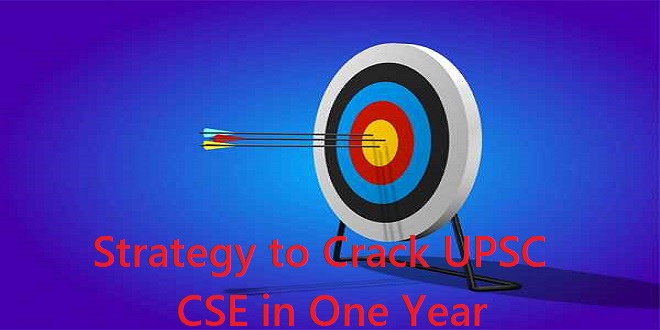Strategy to Crack UPSC CSE in One Year

The Civil Services Exam, conducted by the UPSC is one of the most prestigious exams held in India. Every year, thousands of candidates work hard to clear the exam, but only a few candidates get through. The first attempt of any candidate is given with full enthusiasm. Hence, the first attempt is very important in the UPSC CSE journey.
The main aim of the candidate appearing for the first time should be to clear all the three stages (prelims, mains and the interview) of the examination. The IAS preparation requires not more than one year, if planned strategically. The strategy to clear UPSC CSE in one year (one year before the preliminary examination), is discussed in the article.
Syllabus
A serious aspirant must go through the syllabus first. The syllabus is very important to understand what to read and what not to. Every aspirant must have a printout of the syllabus. It helps the candidate to cover the required topics comprehensively, and enables the candidates to answer the questions in the examination with accuracy.
Current affairs
Current affairs are an integral part of the UPSC syllabus. Often, the questions are asked linking current events with the static part of the syllabus. One newspaper and one magazine would suffice for the preparation. Make short notes while reading newspapers or magazines, as it is a useful tip to learn and memorise. Also, segregate the notes according to the syllabus, as it helps during the last-minute revision of the vast UPSC syllabus.
Begin with NCERTs
NCERTs are the best sources to gain fundamental knowledge of UPSC. It improves a candidate’s basic understanding, analytical and presentation skills. It is recommended to stick to a few books at a time and revise NCERTs multiple times.
Complete optional
Choose the optional in which you are comfortable and also confident. The optional carries 500 marks. So don’t neglect the optional. Try to complete the optional in the first 6 months of your preparation. Also, practice answer writing for previous years’ questions to improve your answer structure and time management.
Prelims and mains
Divide your daily preparation time into current affairs, optional, and GS for prelims and mains. Try to complete the optional in the first six months. Prepare General Studies for prelims and mains simultaneously. Prepare your own schedule or the schedule designed by any reputed institution for prelims and mains preparation. Write a prelims test and mains test every weekend, and analyse your performance. After prelims, you will be left with only three months for mains preparation. So, complete the mains syllabus in the first 9 months of your preparation, along with answer writing. The three months before mains should be dedicated to the revision of mains.
Last three months before prelims
The last three months before prelims must be entirely devoted to the revision and prelims tests. Solve previous years’ questions and one test series of any reputed institute. Don’t stress yourself with too much information. Revision is the most important aspect of prelims preparation. Revise current affairs, static portion and the test series that you have solved. More revisions would fetch you good marks in the preliminary examination.
Three months before mains
These three months should be dedicated to revisions and answer writing practice. Continue newspaper reading, and segregate important topics for essays and general studies. Read government reports and magazines like Yojana and Kurukshetra. You can join a mains test series for result-oriented answer writing practice.
Interview preparation
The interview is conducted for 275 marks. The marks obtained in the written part of the main examination and the interview will determine the final selection of the candidate. To score well in the UPSC interview, the candidate must know the intent behind the interview/personality test. It is intended to reveal the mental qualities of the candidate like:
- Mental alertness
- Critical powers of assimilation
- Clear and logical exposition
- The balance of judgement
- Variety and depth of interest
- The ability for social cohesion and leadership
- Intellectual and moral integrity
The candidate should be prepared for questions on profile, current affairs, situational and behavioural questions.
All three stages of the examination are equally tough. The candidate requires time management, analytical skills, and concise and precise writing skills to get into the final list. Follow the above strategy very closely to stand one among IAS Toppers. Strategy along with patience, perseverance, and dedication are required to crack this examination. UPSC Civil Service Examination is not any normal race; it is a marathon.





